The HP S700 And S700 Pro SSD Review
by Billy Tallis on September 7, 2017 9:00 AM ESTRandom Read Performance
Our first test of random read performance uses very short bursts of operations issued one at a time with no queuing. The drives are given enough idle time between bursts to yield an overall duty cycle of 20%, so thermal throttling is impossible. Each burst consists of a total of 32MB of 4kB random reads, from a 16GB span of the disk. The total data read is 1GB.
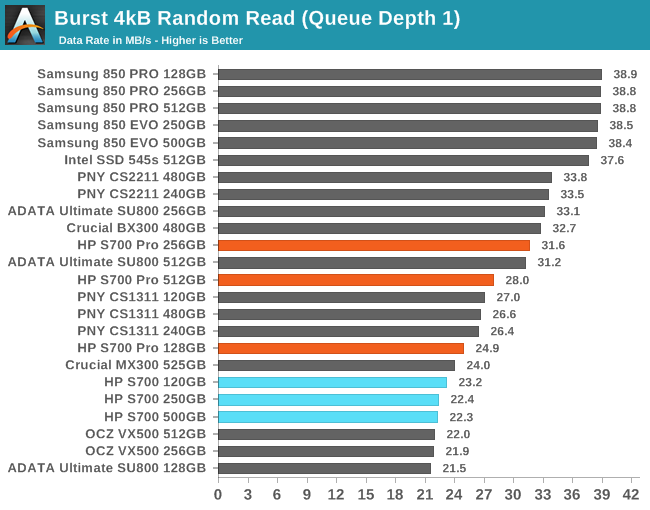
The HP S700 Pro's QD1 burst random read performance is a bit slower than the ADATA SU800 except for the 128GB capacity, but overall the scores are fine for a budget SSD. The S700s all perform similarly and slightly ahead of Toshiba's OCZ VX500 (DRAMless with MLC) and the 128GB SU800.
Our sustained random read performance is similar to the random read test from our 2015 test suite: queue depths from 1 to 32 are tested, and the average performance and power efficiency across QD1, QD2 and QD4 are reported as the primary scores. Each queue depth is tested for one minute or 32GB of data transferred, whichever is shorter. After each queue depth is tested, the drive is given up to one minute to cool off so that the higher queue depths are unlikely to be affected by accumulated heat build-up. The individual read operations are again 4kB, and cover a 64GB span of the drive.
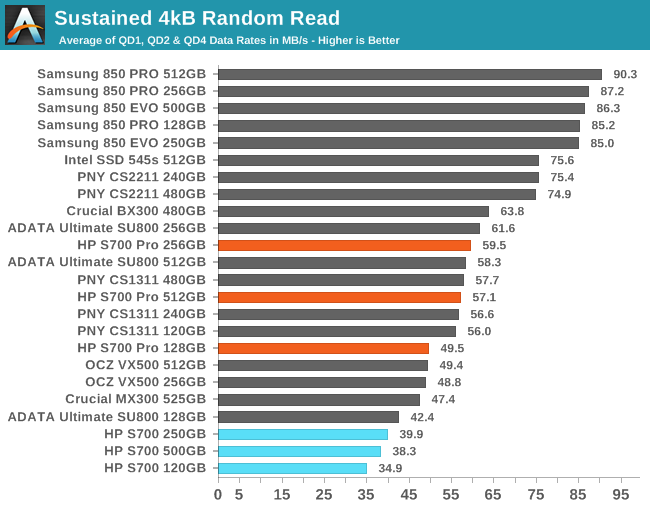
On a longer test and with some higher queue depths, the HP S700 falls to last place, as expected of a DRAMless SSD. The larger two S700 Pros again come in just behind the SU800, while the 128GB S700 Pro beats the SU800 but doesn't match the planar TLC based PNY CS1311.
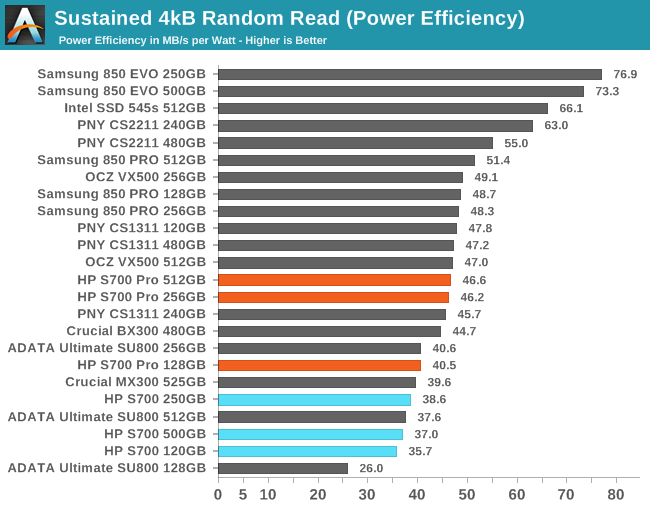
The power efficiency of the S700 is poor but they're not alone at the bottom of the chart. The larger two S700 Pros are about average.
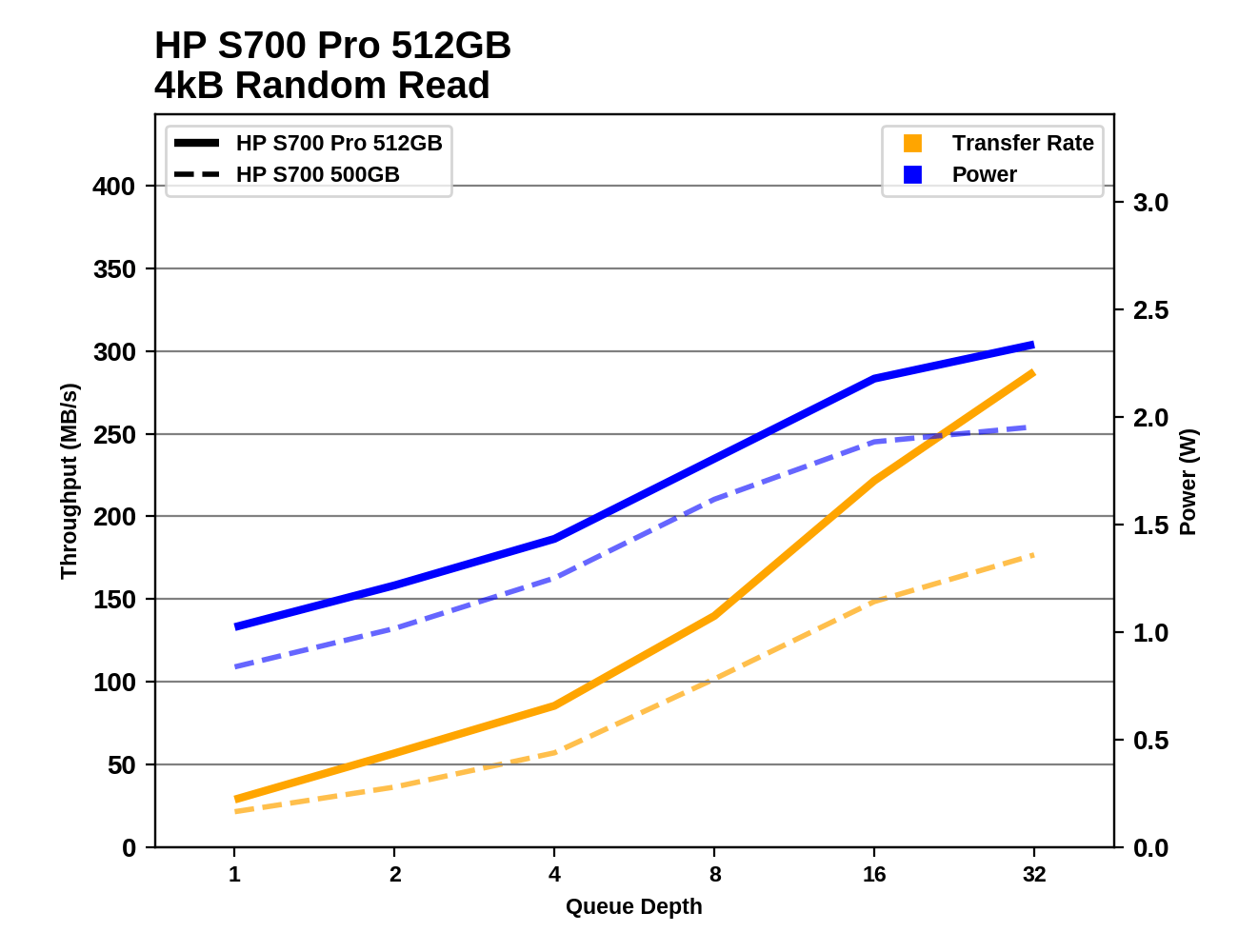 |
|||||||||
The 120/128GB HP drives saturate around QD8, while the 250/256GB HPs show a little bit of performance improvement beyond QD16 and the 500/512GB HPs are still scaling up at the QD32 limit imposed by the SATA link. Unfortunately, none of them come close to the SATA throughput limit even at QD32.
Random Write Performance
Our test of random write burst performance is structured similarly to the random read burst test, but each burst is only 4MB and the total test length is 128MB. The 4kB random write operations are distributed over a 16GB span of the drive, and the operations are issued one at a time with no queuing.
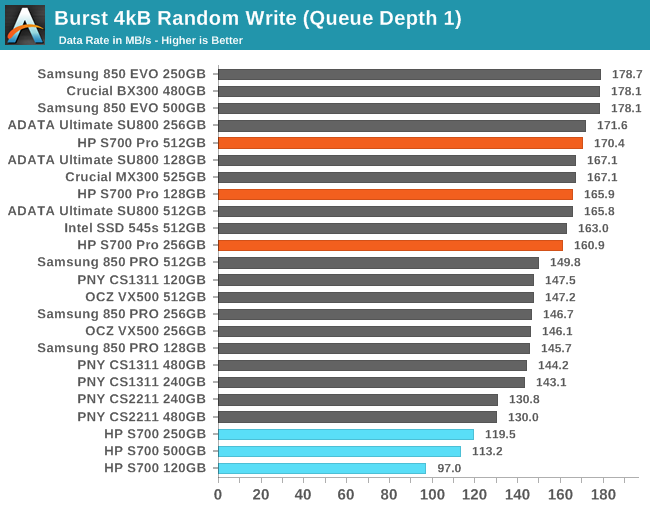
The burst random write performance of the HP S700 Pro is above average at all capacities. The S700 is slowest, but even the 120GB is still more than half as fast as the fastest drive in this bunch.
As with the sustained random read test, our sustained 4kB random write test runs for up to one minute or 32GB per queue depth, covering a 64GB span of the drive and giving the drive up to 1 minute of idle time between queue depths to allow for write caches to be flushed and for the drive to cool down.
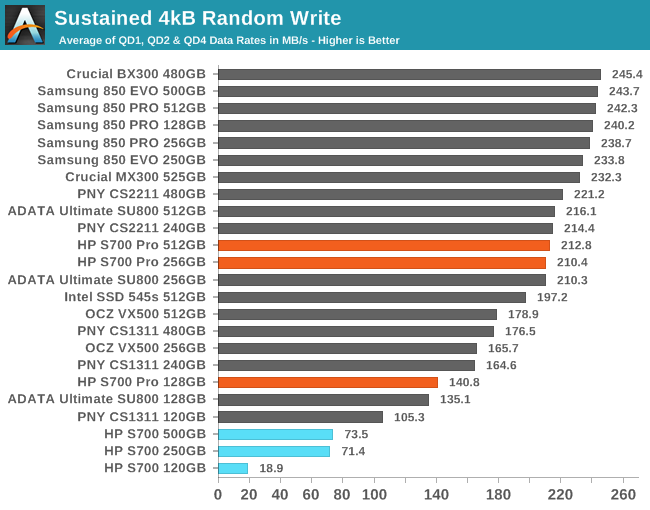
On the longer random write test, the larger two HP S700 Pros maintain average performance while the smallest is at quite a disadvantage, but it's still faster than any other recent 128GB-class SATA SSD. (The 128GB Samsung 850 PRO is very fast, but was discontinued when Samsung migrated to 48-layer 3D NAND.) The 120GB S700 is extremely slow on this sustained test.
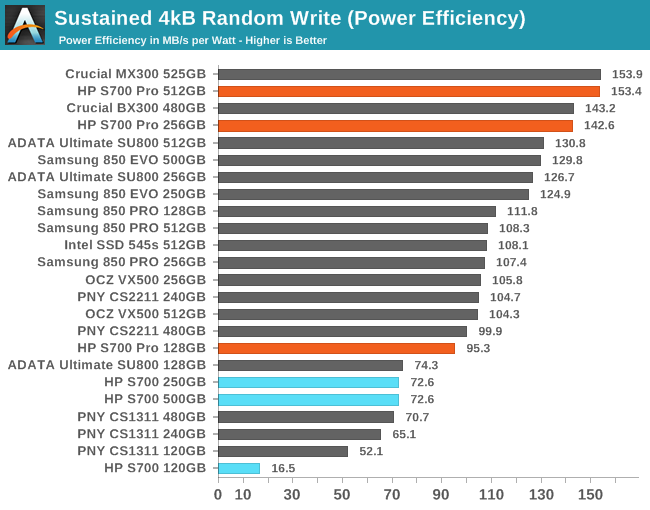
The larger two S700 Pros that offer decent performance also offer great power efficiency, and the smallest S700 Pro is great for its capacity class. The larger two S700s beat the planar TLC drive on efficiency but are otherwise unimpressive, and the 120GB S700's efficiency is little more than a tenth of the best SATA SSDs.
 |
|||||||||
The 512GB S700 Pro's performance scales well from QD1 to QD4, then increases slowly through the rest of the test. The smaller capacities hit the limits of their SLC caches before the end of the test and performance gets much lower and less consistent. The S700s are slow and inefficient throughout the test, but do at least offer the lowest power consumption in absolute terms, hovering just above 1W.










54 Comments
View All Comments
superunknown98 - Friday, September 8, 2017 - link
Did anyone else notice the ADATA SU800 512GB was faster than the HP S700 Pro 512GB for the majority of tests, yet the conclusion said the HP was faster? Granted the HP's of lesser size were faster than their counter parts.petar_b - Tuesday, September 12, 2017 - link
Useless drive. I wouldn't like that drive/controller in my server LOL... Even cheapest Crucial or Micron drives have DRAM at least....morphix - Sunday, April 1, 2018 - link
it's $115 for 512GB @walmartportedbikes - Monday, February 25, 2019 - link
I just had the most annoying failure ever with this HP Pro 512GB drive, formatted it and when trying to install W10 it just died and gave me an I/O device error, it will not be recognized by the bios if connected to a SATA port, but it will be recognized by windows if connected via USB with an enclosure, still not able to format it, or do anything with it, I/O Device error everytime... First and last time I buy one of these drives, they do not even come with trim software, I have never had a problem like this with Samsung, Intel, or PNY SSDs... first time I use HP and failed miserably... reading reviews on Amazon these drives fail as fast as 3 months to 1 year and HP warranty sucks. For $15 extra get an 860 Evo and call it a day, really not worth the savings.